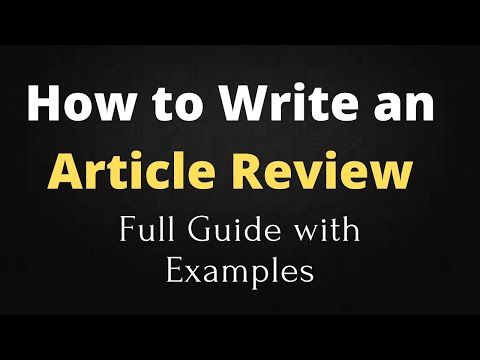

An article review is a critical evaluation of a scholarly or scientific piece, which aims to summarize its main ideas, assess its contributions, and provide constructive feedback. A well-written review not only benefits the author of the article under scrutiny but also serves as a valuable resource for fellow researchers and scholars. Follow these steps to create an effective and informative article review:
1. Understand the purpose: Before diving into the article, it is important to understand the intent of writing a review. This helps in focusing your thoughts, directing your analysis, and ensuring your review adds value to the academic community.
2. Read the article thoroughly: Carefully read the article multiple times to get a complete understanding of its content, arguments, and conclusions. As you read, take notes on key points, supporting evidence, and any areas that require further exploration or clarification.
3. Summarize the main ideas: In your review’s introduction, briefly outline the primary themes and arguments presented by the author(s). Keep it concise but sufficiently informative so that readers can quickly grasp the essence of the article.
4. Evaluate the strengths and weaknesses: In subsequent paragraphs, assess the strengths and limitations of the article based on factors such as methodology, quality of evidence presented, coherence of arguments, and alignment with existing literature in the field. Be fair and objective while providing your critique.
5. Discuss any implications: Deliberate on how this particular piece contributes to or challenges existing knowledge in its discipline. You may also discuss potential improvements for future research or explore real-world applications stemming from this study.
6. Provide recommendations: Finally, offer suggestions for both the author(s) and readers regarding how they can further build on this work or apply its findings in practice.
7. Proofread and revise: Once your initial draft is complete, go through it carefully for clarity, accuracy, and coherence. Revise as necessary, ensuring your review is both informative and engaging for readers.
Sample Review:
A Critical Review of “The Effects of Social Media on Mental Health”
Introduction:
“The Effects of Social Media on Mental Health” is a timely article which investigates the relationship between social media usage and psychological well-being. The authors present compelling evidence to support their argument that excessive use of social media can result in decreased self-esteem, increased anxiety, and a negative impact on interpersonal relationships.
Strengths and weaknesses:
One of the strengths of this article lies in its well-structured methodology utilizing a variety of sources, including quantitative surveys and qualitative interviews. This approach provides a comprehensive view of the topic, allowing for a more nuanced understanding of the effects of social media on mental health. However, it would have been beneficial if the authors included a larger sample size to increase the reliability of their conclusions. Additionally, exploring how different platforms may influence mental health differently could have added depth to the analysis.
Implications:
The findings in this article contribute significantly to ongoing debates surrounding the psychological implications of social media use. It highlights the potential dangers that excessive engagement with online platforms may pose to one’s mental well-being and encourages further research into interventions that could mitigate these risks. The study also offers an opportunity for educators and policy-makers to take note and develop strategies to foster healthier online behavior.
Recommendations:
Future researchers should consider investigating how specific social media platforms impact mental health outcomes, as this could lead to more targeted interventions. For practitioners, implementing educational programs aimed at promoting healthy online habits may be beneficial in mitigating the potential negative consequences associated with excessive social media use.
Overall, “The Effects of Social Media on Mental Health” is an important and informative piece that raises awareness about a pressing issue in today’s digital age. Given its minor limitations, it provides valuable